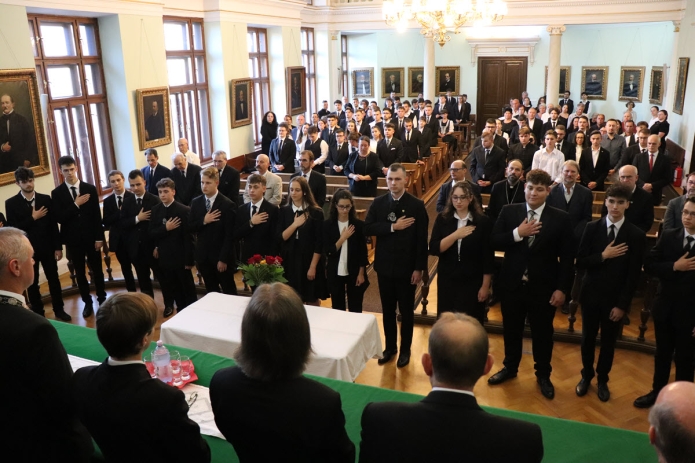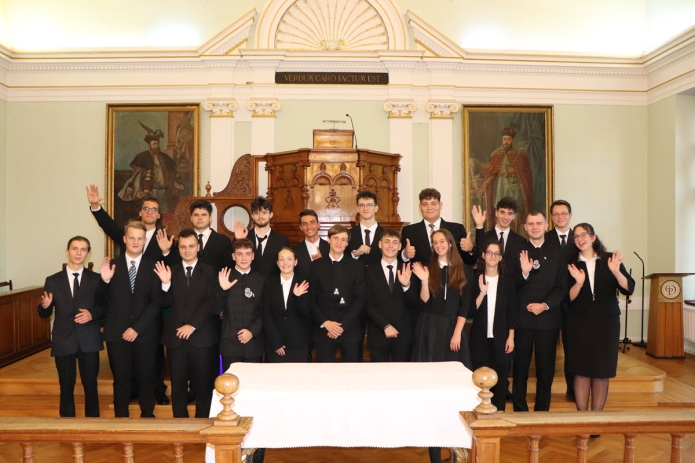Eighteen new students have embarked on the path of theological training at the Protestant Theological Institute in the 2025–2026 academic year.
The 2025–2026 Academic Year Has Begun


On Sunday, September 21, the academic year opened at the Protestant Theological Institute with a Sunday morning church service. The sermon was delivered by Bishop Vilmos József Kolumbán of the Transylvanian Reformed Church District, based on Philippians 1:18: “What is important is that in every way, whether in pretense or in truth, Christ is proclaimed. And in this I rejoice. Yes, and I will rejoice.” In his sermon, the bishop emphasized that, just like the author of the New Testament letter, today’s church may increasingly feel that it is in a “prison” or “quarantine.” This is not a state it has chosen for itself, but one imposed mainly by the forces working against the church. Nevertheless, as the apostle Paul did, the church can carry out its entrusted ministry with joy and Christian responsibility.
During the service, the Institute also sent out into ministry two recent graduates of the pastoral theology master’s program, who completed their studies in the September examination session. After taking their oath, they will continue their work as assistant pastors.
In the evening, at 6 p.m., the official opening ceremony of the academic year took place, where the rector of the Institute, Sándor Kovács, delivered the inaugural address. He began his speech by presenting the life of Mihály Bors from Ciceu-Ciuc, a Unitarian benefactor born 140 years ago. His tragic destiny still carries a message for the academic community today. The rector emphasized: “Learning from the experiences of the past, I would like the Protestant Theological Institute to be a spiritual community where, beyond visible successes, we notice those who thirst for understanding and love. I would like humanity—something not measurable in statistics—to characterize us, alongside the academic performance that can be measured in numbers. I would like us to step out, from time to time, from behind our roles and masks. I want our students to feel that we are here for them, and that QR codes, the Neptun platform, or the study contract are not the most important things, but rather that we look sincerely at ourselves. I would like us, despite our mistakes and imperfections, to prepare with all our strength, mind, and will for the pastoral vocation and ministry.”
Following the entrance examinations held in July and September, 18 young people are beginning their first year of study. Among them are 12 Reformed students from Transylvania, 3 Reformed students from the Királyhágómellék Diocese, 1 Lutheran, and 2 Unitarians. Of the first-year students, 14 are men and 4 are women. The faculty advisor for the first-year class is Tasnádi István, an assistant at the Department of Church History.
At present, the total number of students is 105: 80 in the undergraduate program and 25 in the master’s program. According to the supporting churches, the distribution is as follows: Transylvanian Reformed Church District – 52 students, Reformed Church District of Partium/Oradea – 33 students, Hungarian Unitarian Church – 14 students, Evangelical Lutheran Church in Romania – 6 students. This number is the lowest since 1990, due to demographic changes and general trends affecting Hungarian higher education in Transylvania.
At the opening ceremony, the 18 first-year students took a solemn oath committing themselves to respect the Institute’s regulations and to prepare conscientiously for pastoral ministry.
The rector noted that the 2025–2026 academic year promises to be administratively intensive. The documentation required for the accreditation of the doctoral school has been submitted, and the external evaluation is expected in the spring. By March 2026, the Theological Institute must also prepare the files needed for the five-year institutional re-evaluation and for the re-accreditation of the undergraduate program.
In conclusion, the rector expressed gratitude, on behalf of the Institute, to the supporting churches for their continuous support.